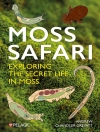Extremophiles have unique physiological properties, thus considered to be ideal candidates for industrial development. This book present concepts on cold-adapted microorganisms, centered on four different aspects – (i) diversity of cold adapted microbes (ii) their ecology, physiology and metabolism (iii) omics research in the field and (iv) their potential applications.
This volume collates the recent developments and innovations with respect to these microorganisms. This book is meant for researchers, biochemists, industries, and government agencies interested in cold active microbes and their products. Also, would be of interest to NGOs and progressive farmers which are working for higher altitude ecosystems throughout the globe.
Spis treści
Chapter 1. Cyanobacteria in cold ecosystem: tolerance and adaptation.- Chapter 2. Cold adapted fungi: evaluation and comparison of their habitats, molecular
adaptations and industrial applications.- Chapter 3. Microbial life in cold regions of deep sea.- Chapter 4. Adaptation to cold environment: the survival strategy of psychrophiles.- Chapter 5. Enzymatic behavior of cold adapted microbes.- Chapter 6. An overview of survival strategies of Psychrophiles and their applications.- Chapter 7. Microbial genes responsible for cold adaptation.- Chapter 8. Survival Strategies in Cold-adapted Microorganisms.- Chapter 9. Microbial adaptations under low temperature.- Chapter 10. Molecular mechanisms of cold adapted microorganisms.- Chapter 11. Microbe-mediated plant functional traits and stress tolerance: The multi-Omics approaches.- Chapter 12. Omics technologies and cold adaptations.- Chapter 13. Use of proteomics and transcriptomics to identify proteins for cold adaptation in microbes.- Chapter 14. Cold adapted microorganisms and their potential role in plant growth.- Chapter 15. Structure and functions of rice and wheat microbiome.- Chapter 16. Cold adapted microorganisms: survival strategies and biotechnological significance.- Chapter 17. An insight to cold adapted microorganisms and their importance in agriculture.- Chapter 18. Nanotechnology for agricultural and environmental sustainability.- Chapter 19. Recent trends and advancements for agro-environmental sustainability at higher altitudes.
O autorze
Dr. Reeta Goel is a Professor and former Head of the Department of Microbiology, G. B. Pant University of Agriculture & Technology, Uttrakhand, India. She has also served as visiting scientist at various institutes in the USA and has more than 35 years of teaching and research experience in the area of plant-microbe interactions, microbial ecology, bio-degradation and metagenomics, especially with reference to higher altitudes. Moreover, she has worked extensively in the field of genomics and proteomics of cold adapted microorganisms. She has published over 100 research articles, book chapters and edited books. She has six patents in her credit, including one U.S. Patent, and received numerous awards for her contributions to science & technology. Presently, she is serving as distinguished Professor at GLA University, Mathura, UP (India) after her retirement.
Dr. Ravindra Soni is an Assistant Professor at the Department of Agricultural Microbiology, I.G.K.V., and Raipur, India. He has more than 11 years of teaching & research experience in the field of agricultural microbiology, microbial ecology, molecular biology & biotechnology, especially with reference of higher altitudes. He was the recipient of DST- Young Scientist award from SERB, Department of Science & technology, India. He was also selected for UGC-DS Kothari Postdoc Fellowship and INSA summer Fellowship. He has published edited books, lab manual, several research articles and chapters in reputed international journals and books.
Dr. Deep Chandra Suyal is an Assistant Professor at the Department of Microbiology, Akal College of Basic Sciences, Eternal University, Baru Sahib, Himachal Pradesh, India. He has been actively engaged in research for 10 years, and has experience in the fields of agricultural microbiology, molecular biology & biotechnology and metagenomics. He is currently investigating the genomics& proteomics of cold adapted microorganisms. He has published numerous articles and books with reputed international journals and publishers. He has three patents in his credit.
Dr. Mahejibin Kahn is a senior scientist at CSIR-Central Food Technological Research Institute, Mysore, India. She has more than 15 years of experience of Microbiology, food microbiology, Microbial Biotechnology and proteomics. She visited several countries and has been awarded United Nation’s University fellowship and worked at National Food Research Institute, Tsukuba, Japan. She is the recipient of several national and international awards and author of various international publications including research paper, book and chapters. She has a good working experience of cold adapted microorganisms.












